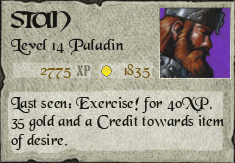I'm currently in the process of building a world, so all of this is in the first half of "trial and error." That means I reserve the right to contradict myself in a few months.
Every work of fiction takes place somewhere. I can hear people objecting, saying, "I wrote something that takes place in a guy's mind!", but I would just say that for our purposes, "world" simply refers to the setting of the story (where and when the story takes place) and the foundation upon which that setting is built (which may or may not involve itself in the story). Basically, "a guy's mind" would be considered a part or the whole of the world in that particular story.
While the setting involves a time period, location, objects in the environment - things that directly affect the character - the world exists beyond the scope of the story and its qualities shape the story and its characters. One of the first things to get a grasp of is the world's immediate history. Figure out what the top headlines would be -- was someone robbed or murdered? If so, how close were they to the characters involved in the story? These are the kinds of things that will weigh on people's minds for a time and potentially affect the way they see and interact with the world. Also know about smaller things, like if a new subdivision recently replaced one of your characters' childhood hangouts. These are important details to know because they provide a context for your characters to meet and interact in. It's the difference between having an actual set and having cardboard cutouts behind the actors in a movie -- the cutouts might get the job done, but it's a whole lot easier to believe in the set.
Once the immediate history is settled, take your characters for a test drive. Get started on your story and ask yourself, "Do I know enough about the past for this story to work?" If the answer is yes, then great! It means you're that much closer to the final product. If no, that means it's time to go back even further.
If you need ancient history, your best bet is to start reading. Learn about real-world history, even if you're planning on creating an entirely fictional world. It also helps to look into the various mythologies that have existed at different periods in time (I recommend pantheon.org) to help shape the beliefs of your characters. Draw on these things as you create your own universe, as it really helps make your characters more complex.
Challenge: Write about an event that took place a thousand years before the story you are working on. Re-write that event as you think it would be known to the characters of your story. Keep in mind the tendency of time to distort the truth, particularly if good records are not kept.



1 comment:
where's your story?
Post a Comment